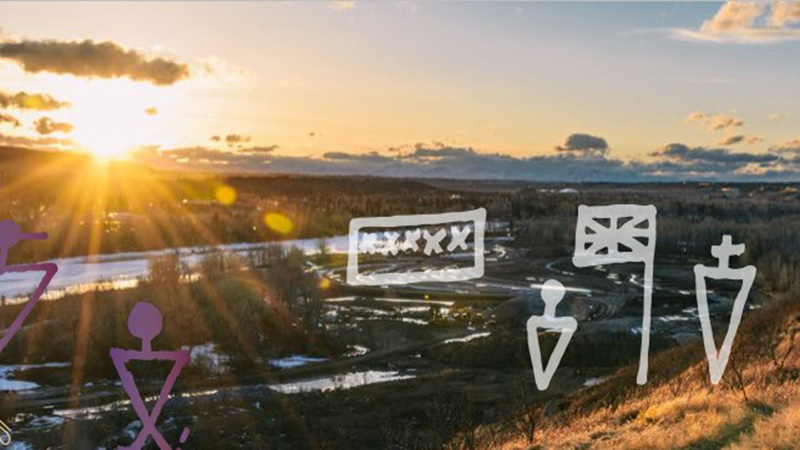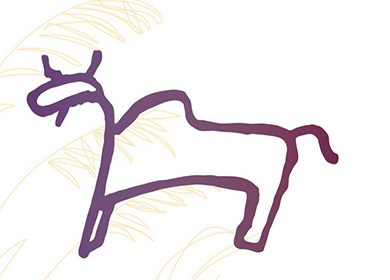Caring for our Mother: Science and story offers solutions to climate change

Robin Wall Kimmerer, Braiding SweetgrassFrom the very beginning of the world, the other species were a lifeboat for the people. Now, we must be theirs.
Traditional Knowledge and Indigenous Ways of Knowing have developed over thousands of years of listening, observing, and cultivating a reverent relationship with the environment. As climate change looms over the globe, the impact for Indigenous People who are dependent on natural systems is magnified, threatening access to traditional foods and plants, water resources, and even forcing the relocation of some communities due to habitat loss. Even the smallest margin of climate change can have large consequences on the biodiversity of gathering, fishing, and hunting sources.
“The land is so sacred, we call it Mother,” explains Lorna Crowshoe, Issue Strategist at The City of Calgary and practitioner of Blackfoot traditional ways. “Everything is animate, including mountains, rocks, rivers. We have this kinship and interconnectedness through spirit. We have ceremonies that help us care for our Mother. It is our moral and ethical responsibility in our world view as we are a part of these ecosystems which need to be maintained. All of this informs us as who we are as Indigenous People…it informs our identity.”
Lorna is steeped in knowledge through her proud Blackfoot heritage and devoted personal practice.
“For us, this is our ancient knowledge, and for non-Indigenous people this is new to them and is very complex. There are many forums and Indigenous scholars who can contribute Indigenous world views as part of climate change conversations. This topic is finally starting to thrive, but I think there is a little bit of fear about how that plays into the scientific Western worldview that's been established,” says Lorna.
Indigenous Traditional Knowledge of the land and environment has been commonly dismissed by many experts as anecdotal and unreliable but is now more broadly recognized as not only legitimate, but accurate. Everything that is learned by Indigenous Peoples comes from Mother Earth. Story carriers transfer knowledge to the generations through storytelling. Specific people are given the responsibly to share stories and that task is viewed as a gift.
“We understand the world in terms of relationships and our way of life in the places we are born. Our rituals include creation stories,” explains Lorna. “Our sacred practices may change from community to community, but we do have fundamental practices that we share about the Earth and about the cosmos, so we have a bond with our environment. We've maintained our relationships despite being colonized and urbanized."
Indigenous People find it very challenging to fulfill their stewardship duties and responsibilities to Mother Earth in their respective ancestral lands because of colonization.
Unchecked, climate change poses a growing threat to the survival of our planet and specifically Indigenous Peoples. Indigenous Peoples are often excluded from processes around climate decisions, negotiating, and policymaking.
The City of Calgary is trying to change that.
In 2017, after consultations with Treaty 7 Knowledge Keepers and urban Indigenous People, City Council approved the Indigenous Policy and Indigenous Policy Framework to guide meaningful long-term efforts to bring Indigenous identities, histories, cultures, languages traditions and Ways of Knowing into municipal planning, advising, and decision making. As part of this commitment to the policy and towards reconciliation, Indigenous representation on the Calgary Climate Panel will help bring understanding of the Indigenous world view and the value it brings to Western science, and support the implementation of actions from the Climate Resilience Strategy.
Updates to The City of Calgary's Climate Strategy and Action Plans will support equitable environments for Indigenous Peoples living in Calgary including members of the surrounding Treaty 7 First Nations and Blackfoot Confederacy.
“As someone who is immersed in this way of life, it is my truth and that is how I want to be heard,” says Lorna. “Others may not agree or understand, but does that make it not true? As a practitioner, I can validate it and can contribute to these conversations, and that's what I think is so exciting for the Calgary Climate Panel and for the work at The City.”
How do we begin to negotiate these ethical responsibilities inherent to Indigenous Traditional Knowledge within the boundaries of a city, when climate change does not recognize borders?
There is much to draw from both Indigenous and Western-based knowledge. Direction is being provided internationally through the United Nations’ Intergovernmental Panel on Climate Change and nationally through bodies like the Canadian Institute of Planners. The City recognizes the importance of having dialogue and building relationships with urban and Indigenous neighbours as the decisions Council makes have impacts on communities outside city boundaries.
The City is uniting science and story with the recognition of how community-based and collectively-held knowledge offers valuable insights complementing scientific data. In February, City leadership had the opportunity to take part in a training session to honour commitments from Truth and Reconciliation Calls to Action, building capacity and understanding amongst employees and decision makers about Indigenous world views. Key to the dialogue was an awareness and understanding about Indigenous perspectives and connections to the environment and how reconciliation begins with the Land and the Rights of Indigenous Peoples.
The City engages with First Nations, through the Indigenous Relations Office, to foster relations, ensure collaboration, the incorporation of Traditional Knowledge, and ensure intersectional climate change strategies. The City of Calgary's Climate Strategy and Action Plans will support equitable environments for Indigenous Peoples living in Calgary and opportunities for shared learning will enhance discussions to support climate strategies and actions moving forward that are inclusive of Indigenous Peoples.
“With collective knowledge of the land, water and sky, Traditional Knowledge keepers are making decisions based on our children, our grandchildren and our great grandchildren, our great, great grandchildren, and the yet to be born,” concludes Lorna. “We consider the future of seven generations; we have the obligation to think that far ahead. We need to sustain our world views and our practices because we need the land and what the land has to offer to sustain us.”
Related links
- Check out the Climate Atlas of Canada that combines climate science, storytelling, and mapping to show national, regional and local impacts.
- Visit the Indigenous Climate Hub to learn more about Traditional Knowledge and climate change.

Siksika (Blackfoot) Creation Myth
By George Bird Grinnell
The Blackfoot believe that the Sun made the earth–that he is the creator. One of the names by which they call the Sun is Napi—Old Man. This is how they tell of the creation:
In the beginning, there was water everywhere; nothing else was to be seen. There was something floating on the water, and on this raft were Old Man and all the animals.
Old Man wished to make land, and he told the beaver to dive down to the bottom of the water and try to bring up a little mud. The beaver dived and was underwater for a long time, but he could not reach the bottom. Then the loon tried, and after him the otter, but the water was too deep for them. At last, the muskrat was sent down, and he was gone for a long time; so long that they thought he must be drowned, but at last he came up and floated almost dead on the water, and when they pulled him up on the raft and looked at his paws, they found a little mud in them.
When Old Man had dried this mud, he scattered it over the water, and land was formed.
Lorna recommends:
- Blackfoot Physics by F. David Peat
- The Sun Came Down by Percy Bullchild
- Braiding Sweetgrass by Robin Wall Kimmerer
- A Blackfoot History: The Winter Counts: Sikaitapi Itsinniiki by Paul Raczka
Changing the Yardstick
“Until now, I have been asking if Indigenous science is truly science, and in so doing I have assumed that only one yardstick exists that provides a standard set of definitions – Western science. But this is not a question whether Indigenous exists in its own right, but to enquire how it measures up to Western science. As far as Indigenous people are concerned, there is no need for them to justify their spirituality, their traditions, or their science by reference to anything external to their society. It has no need to compare or authenticate itself against the standard Western science. Because it may not always accord with the dictionary definitions of science does not mean that it is not a valid discipline and way of knowing in its own right.”
- F. David Peat, Blackfoot Physics
Categories: Climate, Indigenous

